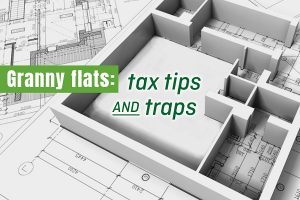The idea of adding a granny flat to your property sounds like a great idea. A property to rent out to generate some welcome extra income, or a home for adult children or mum and dad in their later years. But there are important tax and personal considerations to consider before taking the plunge and digging up the backyard.

Although the Federal Budget proposed significant reform in this area (which we cover later in this article), important tax questions remain.
Tax and granny flats: what you need to know
A granny flat is usually a self-contained secondary dwelling with a separate entrance, bathroom, kitchen and living space.
Unlike an investment property, granny flats do not have a separate title and are built within the boundary of your existing property or attached to your home. A granny flat cannot be sold separately unless you subdivide the existing property title.
Before you rush off to start building, you need to carefully consider the tax implications and get professional advice, or you could find yourself facing significant tax bills.
For example, if you rent out your granny flat at commercial rates to a third party like a student, the rent will be assessable incomeand you will pay income tax on it at your marginal tax rate. You are, however, entitled to claim the normal deductions for depreciation against income from an investment property.i
Subdividing the property could also create a GST obligation as the flat may be deemed a new residential property.
Granny flats and capital gains
Under current legislation, the main tax issue when adding a granny flat is that it can create a capital gains tax (CGT) headache when it comes time to sell your home. CGT is payable on the difference in value between the time you bought the property and the time you sell.
Normally, your main residence is exempt from CGT, but adding a granny flat can affect this. If you charge rent to a student living in your granny flat for example, you will lose some of your main residence exemption from CGT as the property is partly being used for income-producing purposes.
When it comes to family, such as an elderly parent or disabled child lives in a granny flat and does not pay commercial rent, generally the main residence exemption still applies as the chief purpose of the arrangement is private or domestic.
CGT and cash contributions
Things get more complicated if a relative provides a cash sum to help pay for the cost of building a granny flat in return for a right of occupancy for life or life interest.
Under current tax laws, a cash sum paid by one party to build a granny flat is a CGT event. This means if your parent makes a financial contribution towards you building a flat to live in on your property, you will have a partial CGT liability to pay when you eventually sell your home. To make things worse, the normal 50 per cent discount on CGT for the disposal of an asset held for over 12 months may not be available.
Potential for elder abuse
In many cases, concern about paying CGT means families fail to put formal agreements in place when a relative makes a contribution to pay for a granny flat. This leaves the family member with no protection if the relationship breaks down and also creates the potential for financial abuse.
The family member can also lose out financially if they need to move into an aged care facility, or if there is an unexpected change in the homeowner’s circumstances (such as a divorce) and the property needs to be sold.
It’s also important to note that an interest in a granny flat can affect the person’s social security entitlements and aged care fees.
Proposed Federal Budget exemption
To solve some of these issues, the October 2020 Federal Budget included a proposed CGT exemption for granny flats where a formal written agreement is in place. The new measure will be limited to arrangements covering family relationships and disabled children – not commercial rentals.
Although the Budget announcement did not include a start date, the new exemption is expected to apply as early as 1 July 2021.
Eligibility conditions for the new CGT exemption will depend on the legislation being passed by Parliament at a future date.
While the announcement provides certainty for families about some potential CGT issues, it’s not clear yet if the main residence exemption will apply to all granny flat arrangements.
10 tips for granny flat arrangements
- Get all the parties together to consider potential future scenarios.
- Discuss how problems or financial conflicts will be resolved.
- Seek legal advice to avoid problems. Don’t draw up an agreement on the kitchen table.
- Ensure the person moving in has a legal interest reflecting their financial contribution.
- Confirm all parties fully understand the agreement.
- Consider placing a caveat on the title indicating an interest in the property.
- Establish a written agreement on who pays which bills.
- Include a minimum term for the agreement.
- Outline all the parties’ expectations (e.g. how much babysitting or property maintenance is expected).
- Decide on an exit strategy and valuation approach.
If you are considering building a granny flat on your property, contact us today to discuss the potential tax implications.
i https://www.ato.gov.au/General/property/your-home/renting-out-part-or-all-of-your-home/
Did you enjoy this article?
Click below to share it
More News Articles
Subscribe to Our Mailing List & Connect Through our Socials
While you may have come to us from a variety of sources, the time has never been better to join us.
Subscribe to our mailing list and connect through out socials to keep up to date with our latest news and get some tips.










